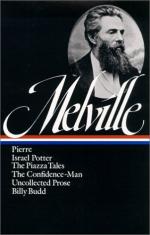“I was right,” thought Israel to himself. “But where does Horne Tooke live?” he demanded again.
“He once lived in Brentford, and wore a cassock there. But I hear he’s sold out his living, and gone in his surplice to study law in Lunnon.”
This was all news to Israel, who, from various amiable remarks he had heard from Horne Tooke at the Squire’s, little dreamed he was an ordained clergyman. Yet a good-natured English clergyman translated Lucian; another, equally good-natured, wrote Tristam Shandy; and a third, an ill-natured appreciator of good-natured Rabelais, died a dean; not to speak of others. Thus ingenious and ingenuous are some of the English clergy.
“You can’t tell me, then, where to find Horne Tooke?” said Israel, in perplexity.
“You’ll find him, I suppose, in Lunnon.”
“What street and number?”
“Don’t know. Needle in a haystack.”
“Where does Mr. Bridges live?”
“Never heard of any Bridges, except Lunnon bridges, and one Molly Bridges in Bridewell.”
So Israel departed; better clothed, but no wiser than before.
What to do next? He reckoned up his money, and concluded he had plenty to carry him back to Doctor Franklin in Paris. Accordingly, taking a turn to avoid the two nearest villages, he directed his steps towards London, where, again taking the post-coach for Dover, he arrived on the channel shore just in time to learn that the very coach in which he rode brought the news to the authorities there that all intercourse between the two nations was indefinitely suspended. The characteristic taciturnity and formal stolidity of his fellow-travellers—all Englishmen, mutually unacquainted with each other, and occupying different positions in life—having prevented his sooner hearing the tidings.
Here was another accumulation of misfortunes. All visions but those of eventual imprisonment or starvation vanished from before the present realities of poor Israel Potter. The Brentford gentleman had flattered him with the prospect of receiving something very handsome for his services as courier. That hope was no more. Doctor Franklin had promised him his good offices in procuring him a passage home to America. Quite out of the question now. The sage had likewise intimated that he might possibly see him some way remunerated for his sufferings in his country’s cause. An idea no longer to be harbored. Then Israel recalled the mild man of wisdom’s words—“At the prospect of pleasure never be elated; but without depression respect the omens of ill.” But he found it as difficult now to comply, in all respects, with the last section of the maxim, as before he had with the first.
While standing wrapped in afflictive reflections on the shore, gazing towards the unattainable coast of France, a pleasant-looking cousinly stranger, in seamen’s dress, accosted him, and, after some pleasant conversation, very civilly invited him up a lane into a house of rather secret entertainment. Pleased to be befriended in this his strait, Israel yet looked inquisitively upon the man, not completely satisfied with his good intentions. But the other, with good-humored violence, hurried him up the lane into the inn, when, calling for some spirits, he and Israel very affectionately drank to each other’s better health and prosperity.




